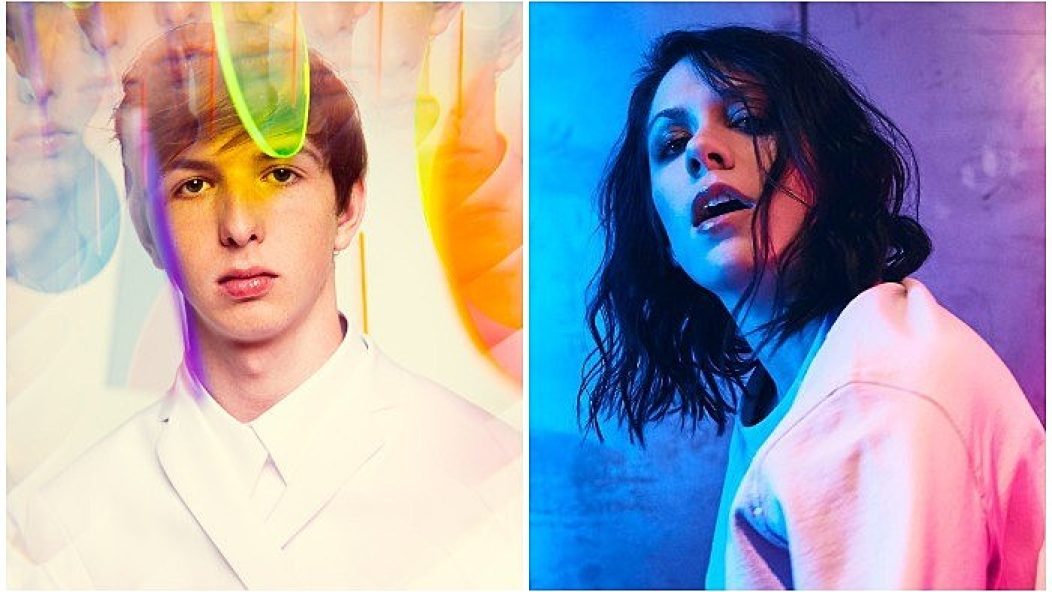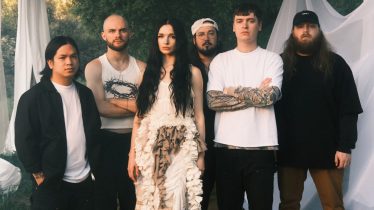
How K.Flay and Whethan are defying genre lines in their latest collab
With the amount of different styles of music, trying to stay within a set genre is becoming more difficult and almost unnecessary. That shows when artists such as genre-mixer K.Flay and producer Whethan team up to create songs featuring heart-hitting lyrics and synth-filled rhythms like their latest track, “Hurting On Purpose.” The two exclusively opened up to AltPress about their creative process and how long the track has been in the making.
K.Flay (Kristine Flaherty) is known for blurring genre lines and mixing them to suit her needs. In the past, the singer has commented on subjects from climate change to politics and continues to delve into difficult topics with her recent collaboration. She previously worked with Canadian producer Vanic on her latest release “So Slow” and says she looks forward to working with other artists as her career progresses.
Read more: Bandcamp’s monthly artist fundraisers will happen for the rest of 2020
Ethan Snoreck began releasing music as Whethan in 2016 with a redo of Opia’s “Falling.” The young producer has since toured with the Chainsmokers and collaborated with artists such as Oliver Tree, MAX and Dua Lipa. Throughout his career, Snoreck says he’s not one to let genres hold him down and explores different styles of music to incorporate into his tracks.
“Hurting On Purpose” will be featured on Whethan’s upcoming debut full-length, FANTASY, due out later this year. Check out his and K.Flay’s collaboration, the process of how the track came together and their thoughts on melding genres below.
Ethan, “Hurting On Purpose” will be featured on your upcoming debut album, FANTASY. How do you decide which tracks make the cut? As a producer, you’ve worked with many artists in the past. How do you know when a specific artist works on a track?
SNORECK: I really like that records stand the test of time. I feel like back when I was playing shows, that was a good example of being able to test out songs in live settings and see how people react to them. Most of the songs I put out have a certain energy that I want to be able to play live, whether you can dance to it or mosh to [it] or go hard. With artists too, I love to collab with all different types of artists in all different genres. Whenever it just links up and clicks and feels super right for both of us, it just fits.
Both of you have collaborated with other artists in the past on your own respective pieces, but what was the process when working on “Hurting On Purpose”? How did you both connect, who wrote the lyrics and what were the other steps for getting the track put together?
SNORECK: I got started with this song. I think it was almost three years ago. [K.Flay] wrote it in a camp along with a couple of other producers, and I immediately loved it right away. I pretty much took the vocals and basically spent the next two years writing all these different production versions just trying to fit. Most of it was already there, the bulk of the song, the emotion was all there, but it was just a matter of finding the right moment for my time to shine on the track. I love when producers have their moment on a song, and I just wanted to make sure I had a moment on the song that didn’t ruin it.
FLAHERTY: Outside of just K.Flay stuff [that] I’ve been doing for the past few years, I’ve been doing a lot of songwriting on other records and then just doing a couple of little camps here and there. I had written this song at a writing camp in Las Vegas, and I think I wrote four songs that weekend or something, and then I went on my own way. I was touring at the time, I didn’t even know that this song was in the world. We all really liked it when we first did it. Then I heard Ethan was working on it, which was exciting.
Read more: 15 female artists who are inspiring women everywhere
What was interesting was that we did it in half a day. It was a really short thing. When I heard it back, I realized if it was going to be my voice on the track, I wanted there to be a lyrical shift. The original version of “Hurting On Purpose” only said “I’m hurting on purpose/I’m in love with the pain.” In this version, our first verse is like “I’m in love with the pain/I’m hurting on purpose.” The second verse is “I’m hurting on purpose/This shit isn’t working.” I had enough of it. Whenever I’m on a track, I want ideally for there to be some evolution in the song. I think for me and a lot of people, you engage in destructive behavior [and] you get a certain outcome. You can only do that so many times before you realize this shit isn’t working.
Kristine, you meld different styles, such as R&B and rock, into your music. How has your sound developed over time, and do you believe other artists let genres hold them back when it comes to trying to find their own voices?
FLAHERTY: I started out making music in the Bay Area rap scene. That was my starting point—very, very focused on rhythm [and] cadence. That was the primary stuff. Melody was secondary. As I’ve evolved, at times it’s felt like a curse not being clearly in one lane, but it has awarded me the opportunity to tour with and collaborate with so many people. At some point, it just blew up all the doors, so it didn’t really fucking matter anymore. No one cared. I think, for me, the evolution has been largely about melody and largely about incorporating the way I like to perform—it’s very rock in terms of my body movement, headbanging and freedom.
I do think genres are much more fluid in the modern music scene. There’s a lot of reasons for it, [but] I think most people are excited about perspective over genre. As an artist, having a perspective is the most important thing. It doesn’t really matter how you’re communicating that stylistically. It’s easy to get told by other people that genre really matters, but I don’t actually think it does.
The lyrics reflect on things that could lead to self-destruction: speeding, drinking, smoking. You both tackle a variety of topics with music from love to politics and climate change. What’s the inspiration behind the track? Is it based on your own experiences?
FLAHERTY: [It’s] definitely based on my own experiences. I think being a touring musician really pushes the limit on this stuff. It is a world in which a lot of self-destructive behavior is normalized, glorified and just frankly institutionalized. It’s just part of it. For me, much of my adult life has been reckoning with that, testing my limits, deciding I want to go back. As my therapist recently said to me, some mistakes you have to make yourself, and I think that lyrically, this song is about that.
What are your experiences creating a track solo versus with another artist? Are there challenges that come with creating a song, and what, if anything, makes writing a track easier?
SNORECK: I love collaboration. I always think two heads are better than one. When you’re by yourself, I’ve found that you can go down more crazy rabbit holes, and it only takes one little idea from someone else to just take you in a whole other direction. It’s very fun to collaborate with people, but when you’re by yourself, it’s fun to experiment and not have anyone to really worry about and just be free.
FLAHERTY: I think there’s huge creative bounty to collaboration, but I also think there’s huge creative bounty in being alone. There’s some special alchemy to it… There’s something about being by yourself, judgment-free and really experimental. No one is going to say anything about what you do, and there’s something liberating about that. For me, it’s that tension. Half the time I like to be by myself, and half the time I like to be with other people. I agree with Ethan in general: Two heads are better than one, especially if it’s a head you trust.
As Whethan, your music has millions of listens on Spotify and has been used in several TV shows and even a movie. You just turned 21 and have been releasing music for the past four years. What were your goals when you first started? Have they changed? How do you think you’ve grown as an artist over the last few years?
SNORECK: When I first got into it, I really didn’t have any goals. The only thing I could really do was music. All day, every night, getting home from school, I would pretty much not do anything else but just make music. Once I got a little bit of success and people started listening, my goals started to shift a little bit, for sure. It used to be that I would just play a concert [and] play Lollapalooza in my hometown. Now, maybe [I can] hopefully try to win a Grammy someday. That’s a crazy goal switch.
As a producer, I’m constantly dabbling in different genres. When I first started it was a lot more electronic and future-y, but I’ve slowly progressed in a little bit more of an alternative way and finding cool ways to mix them all back together. I have a weird relationship with goals because I don’t like to set too many. Not that I can’t reach them, but I just feel better riding the wave, just accepting everything that comes with it and enjoying the rewards as they come.
With K.Flay, you’ve been able to travel the world, meet a plethora of different people and personalities and worked with Bishop Briggs on her CHAMPION LP last year. When you began your career, did you ever think you’d be where you are now? Do you see yourself delving more into writing and production with other artists in the future?
FLAHERTY: I never thought this. I started doing music at [Ethan’s age]. I was on a whole different path in terms of my academics. That was my focus. It came to me as this thing that tapped me on the shoulder and was like, “Hey, there’s another way you can live.” For me, it’s been such a cool journey. I was like Jim Carrey in Yes Man. I just keep saying yes to shit and things kept happening… There’s a power to being so open, and I think it’s been the prevailing ethos of my career and adult life. Sometimes I’d say yes to the wrong things. Of course, that’s going to happen. I certainly never expected this was how my life would shake out.
Read more: 10 modern musicians keeping the political conversation alive
I’ve spent quite a bit of the last two years working on other artists’ projects, and it’s an interesting development. I never anticipated that as to where my career would go. No one really understands that when you write a song, someone is the asshole that has to sing it. Someone has to get up every night and sing that song and stand behind it. I think there’s something spiritual about feeling that. Singing it for 10 people or whoever shows up, there has to be a real sense of ownership and belief in something for it to translate. As a songwriter, that’s one of the things I try to bring to any collaboration.








